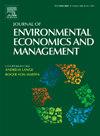To go electric or to burn coal? A randomized field experiment of informational nudges
IF 5.9
3区 经济学
Q1 BUSINESS
Journal of Environmental Economics and Management
Pub Date : 2025-04-11
DOI:10.1016/j.jeem.2025.103155
引用次数: 0
Abstract
Coal heating in residential homes is an important source of indoor air pollution, leading to detrimental health effects. We conduct a randomized field experiment in northern China using three types of SMS campaigns targeting three potential biases that may hinder the adoption of electric heating: Cost SMS campaign, designed to address the overestimation of electricity expenses; Health SMS campaign, aimed at addressing the underestimation of health damage associated with coal heating; and Social Comparison SMS campaign, intended to inform households about the popularity of electric heating. We find that the Cost SMS backfires: it instead leads to a substantial reduction in electric heating. This can be attributed to salience bias induced by the Cost SMS, which drew heightened attention to the cost of electricity. The Health SMS is ineffective for households that underestimate the health damage of coal heating. Social Comparison SMS is only effective for a small proportion of households who were concerned about their neighbors’ heating choices. Overall, our findings suggest that SMS campaigns targeting these biases are largely ineffective, and caution should be exercised when applying plausible nudge interventions. The findings also suggest that households may be motivated to maintain their beliefs and resist paternalistic interventions.
用电还是烧煤?一个随机的信息推送实验
住宅用煤供暖是室内空气污染的重要来源,对健康造成不利影响。我们在中国北方进行了一项随机现场实验,使用三种类型的短信活动,针对可能阻碍采用电供暖的三种潜在偏见:成本短信活动,旨在解决电费费用的高估;健康短信运动,旨在解决对与煤炭供暖有关的健康损害的低估问题;和社会比较短信活动,旨在告知家庭关于电供暖的普及。我们发现成本短信适得其反:它反而导致了电加热的大幅减少。这可以归因于成本SMS引起的显著偏差,它引起了对电力成本的高度关注。健康短信对低估燃煤取暖对健康危害的家庭来说是无效的。社会比较短信只对一小部分关心邻居供暖选择的家庭有效。总的来说,我们的研究结果表明,针对这些偏见的短信活动在很大程度上是无效的,在应用合理的助推干预措施时应谨慎行事。研究结果还表明,家庭可能会有动力维护自己的信仰,抵制家长式的干预。
本文章由计算机程序翻译,如有差异,请以英文原文为准。
求助全文
约1分钟内获得全文
求助全文
来源期刊
CiteScore
8.00
自引率
4.30%
发文量
91
期刊介绍:
The Journal of Environmental Economics and Management publishes theoretical and empirical papers devoted to specific natural resources and environmental issues. For consideration, papers should (1) contain a substantial element embodying the linkage between economic systems and environmental and natural resources systems or (2) be of substantial importance in understanding the management and/or social control of the economy in its relations with the natural environment. Although the general orientation of the journal is toward economics, interdisciplinary papers by researchers in other fields of interest to resource and environmental economists will be welcomed.

 求助内容:
求助内容: 应助结果提醒方式:
应助结果提醒方式:


